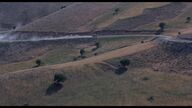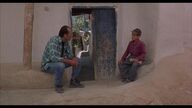In 2000, Abbas won the Venice Film Festival Jury Prize for "When the Wind Is Back". It is said that after receiving the award, Abbas said that he would no longer participate in the film festival and would reject all awards from the film festival.
In my opinion, Abbas said this is neither a success, nor is he insisting on leaving opportunities to young people. I think the thoughts brought out by this movie are enough to make Abbas feel totally disappointed.
People live for what? What is life waiting for? Can the things you wait for give you meaning? Haven't you been making meaningless efforts for some meaningless purposes? Have you felt your efforts? After you get it, do you cherish these efforts?
These simple and complex issues are enough to destroy everyone, especially those who are good at summarizing and thinking. I think Abbas is such a person. The previous article mentioned his search for friendship, passion and vitality for life, love, and death. After discussing these, what will be left of Abbas? Even death is over, will there be results below? If there is a result, I don't believe it, this will be explained and answered by a mortal like Abbas.
After all, Abbas will not be able to open the door to another inanimate world during his lifetime. Abbas can only walk into nothingness. His nothingness has the emotional color of Sartre-style nothingness, straightforward and intuitive, and at the same time has the emptiness of Heideggerian nothingness.
I guess that when Abbas was conceiving this film, he would always look up at the sky. There may be no stars in the sky at all, but there must be wind, and there must be a very crisp and hearty wind. Sometimes the sound of the wind is like A breath of life.
"When the wind rises again" is a free translation by the people of Hong Kong. The English name is "THE WIND WILL CARRY US". I like the feeling of the original English text, "The wind will take us away". It feels so good that we are like being held hostage. Brought into the wind, we are flying, flying lightly, no one knows which day we will fall, and no one knows how high we can fly.
In my opinion, this is the most mature film of Abbas technology. Its lens selection and editing process are free of randomness and basically get rid of the gentle narrative lens. In this film, those who have had contact with and established a relationship with the protagonist Bazaar, except for the little boy’s hair, are almost all arranged outside the screen. In the screen, there are often some invisible faces. For example, doctors who need first aid and see the elderly for the elderly, such as Bazaar's companions, they are all out of the picture, and you can only hear their voices. It seems that Bazaar is a flying bird. He can see his companions but cannot look into their eyes.
And so is the story itself. Baza and three staff came to a village in Kurdistan, the purpose of which was not stated. They were only received by a ten-year-old boy, and Bazaar was full of interest in an old man who was still on the sickbed. The old man’s condition was up and down, which affected Baza’s heart. Bazaar, who came to the small village, almost lost contact with the outside world, so he had to go to the top of the mountain to call on his mobile phone. Otherwise, Baza has nothing to do in the village. Later, the colleague who came with him slipped away quietly, and the old woman finally died. Baza took a few funeral pictures and left the village.
According to the usual appreciation habits, when watching movies, I would guess Bazaar’s profession. When Baza took out his camera, I felt that Bazaar should be a photographer for a photo agency. The purpose of his trip should be to take a photo. Funeral with local characteristics.
But obviously this is wishful thinking. The reason why we are obsessed with one point is precisely because we are not used to thinking about movies with no purpose. While thinking, we will try our best to get the characters back into place. In this way, you can analyze him and grasp him.
This video made me understand that there is no point in homing at all. Although you can summarize the purpose of life for a period of time, how can you summarize the purpose and meaning of the whole life?
Baza left, I think the reason he left was not because he completed the task, but because he penetrated the deepest nothingness.
The loneliness of real life and the eagerness for quick success in the past are a kind of paradox. Since I am lonely, why are I involved in a purpose for the sake of others? In the involvement, it is only myself who pay the price.
Some people say that the village of Siadala that Abbas showed in the film is like a maze. I think, for Baza, what he has stepped into is a maze of life. When he first entered the village, he did not choose to enter through the gate of the village, but climbed into the village through a path. This kind of informal entry is an accidental entry, and it is inevitable for him to be fascinated by it in such an entry.
In addition, I think that Bazaar went to the top of the mountain to call on his mobile phone, which is also a very meaningful design. This is not just a telecommunication problem. The Bazaar is a mountain that is close to the purpose and allows him to understand other people’s intentions. At that highest point, Baza encountered an unexpected accident-death. The person who digs the pit for other purposes eventually buried himself. What kind of meaning is this?
This film, in addition to making me feel ideological and technically satisfied, is also a bit unpleasant. I think that the maturity of technology has increased Abbas's craftsmanship to some extent, and the profound thinking has exposed a lot of moralistic content, which is very dazzling and uncomfortable. For Abbas, this is not a good thing. An artist, an artist engaged in creation, should not be too thorough about some things, he needs something exploratory, something that makes the viewer feel obscure and meaningful. In this way, he will constantly go from one transcendence to another transcendence.
It is obviously difficult for Abbas to go further. I think this may be another reason why he no longer participates in the awards.
View more about The Wind Will Carry Us reviews







